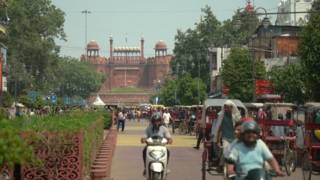
Topics
Guests
- Dave Vaseythe first person arrested under a new law in Toronto that allowed police to detain anyone near the site of the G20 summit if they failed to identify themselves. The regulation was a temporary one for the G20. It kicked in on June 21st and expired on June 28th, the day after the summit ended.
The Canadian Civil Liberties Association says it is looking into suing the Toronto Police Department following mass arrests at the G20 summit last week. It is now estimated that 1,000 people, including many journalists, were arrested. On Thursday, protest rallies were held in Toronto, Montreal and Winnipeg against the brutal police crackdown. Civil liberties advocates are also up in arms after it emerged that the Toronto police were secretly given new and unprecedented powers of arrest in the lead-up to the G20. We hear from Dave Vasey, the first person arrested under a new law in Toronto that allowed police to detain anyone near the site of the G20 summit if they failed to identify themselves. [includes rush transcript]
Transcript
AMY GOODMAN: In Canada, a civil liberties group says it’s looking into filing a lawsuit against the Toronto police following mass arrests at the G20 summit last week. The Canadian Civil Liberties Association says it’s been overwhelmed with phone calls and complaints. It’s now estimated 900 people, perhaps a thousand, including many journalists, were arrested over the weekend. Toronto Police Chief Bill Blair says the department has launched an internal review, but there are growing demands for a public inquiry. On Thursday, protest rallies were held in Toronto, Montreal and Winnipeg against the brutal police crackdown.
Civil liberties advocates are also up in arms after it emerged that the Toronto police were secretly given new and unprecedented powers of arrest in the lead-up to the G20. On June 2nd, Ontario secretly changed its Public Works Protection Act to allow police officers special powers to arrest anyone near the site of the summit if they fail to identify themselves. The new regulation only came to light after it was used for the first time on a thirty-one-year-old man who was arrested near the “security fence” after he refused to identify himself to the police. Dave Vasey was held for hours, without knowing why, before being released. His story was front-page news at the Toronto Star.
I caught up with Dave Vasey at the march on the streets of Toronto this weekend and asked him to talk about what happened.
DAVE VASEY: My name is Dave Vasey. The other day, Thursday, following the indigenous sovereignty and solidarity march, a friend of mine and myself were walking down by the fence area, just checking out what a $1.2 billion fence looked like, and we had a couple marks that marked us as activists. We had a bag saying “Homeland Security” and another one saying — a sticker with “No Olympics on stolen Native land.” The police grabbed us, began to ask for identification. And we were operating within the “know your rights” frame, which it said you don’t need to provide identification to the police unless you’re under arrest. I continued to just say that I was not comfortable with providing my identification to the police. They said if I didn’t, I would be placed under arrest, and I was subsequently placed under arrest and held for five hours at the movie studio jail complex.
AMY GOODMAN: Did you ask why?
DAVE VASEY: I had asked, and they had said there was a new bylaw in effect. But they had done an illegal search on us the night before we were detained, the night before. They illegally searched our bags, even though we had said, “We don’t consent to our bags being searched, and we know this is illegal.” So I hadn’t heard of this bylaw at all and was just operating under what I knew from what the legal community had provided to protesters before that.
AMY GOODMAN: What are your plans now?
DAVE VASEY: We’ll be launching a lawsuit on Monday against the police for violating constitutionally held rights.
AMY GOODMAN: A lot of people are surprised by this law. Is it a temporary law?
DAVE VASEY: I have no idea. I’m hoping it’s a temporary law, but no one knows anything about the law at this point. Even the legal community, when I spoke with them, they had no idea what the implications were. They didn’t even know how it actually was going to operate during the summit.
AMY GOODMAN: Dave Vasey, the first person arrested under the new law in Toronto that allowed police to detain anyone near the site of the G20 summit if they failed to identify themselves or refused to allow their bags to be searched. The regulation was temporary for the G20. It kicked in on June 21st and expired on June 28th, the day after the summit ended.













Media Options